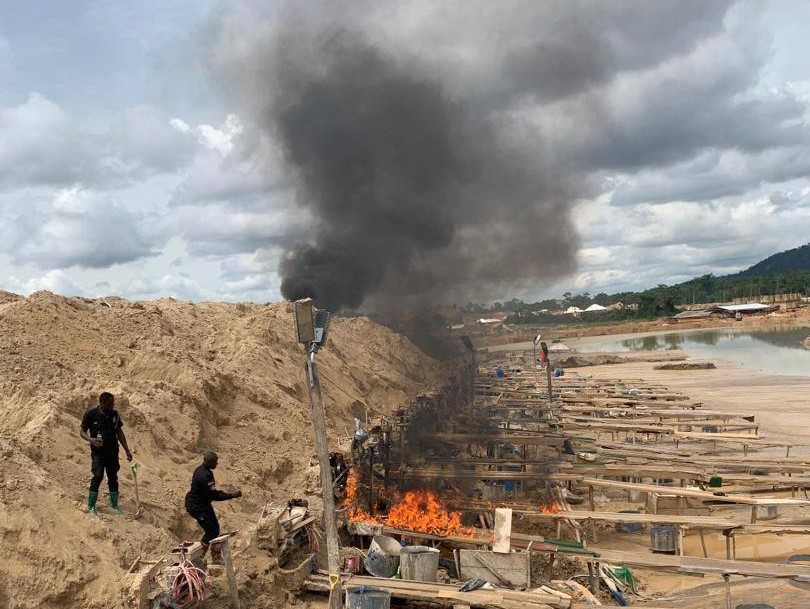In preparing for a raid on a notorious illegal mining settlement known as Abrewa Ni Nkrane, members of the Ghana Armed Forces and the Forestry Commission expected to find about 2,000 illegal miners.
At sunrise on April 15, they discovered a much bigger operation. The sprawling hideout near the Subri Forest Reserve was home to more than 10,000 people, including foreign nationals from Burkina Faso, Guinea, Mali, Niger and Nigeria.
“The sheer number of people we are going to arrest would not even fit in our vehicles, and there is no jail facility that can post them all,” Western Regional Forestry Manager Nana Kwabena Bosompim said in an impromptu news conference with makeshift buildings burning in the background. “We just had to raid the community and burn down the equipment and make sure everybody is flushed out. We are going to be here for the next two weeks and will make sure every illegal miner is [removed] from this community.”
Beyond illegal gold mining, known in Ghana as galamsey, the camp was a major hub of criminal activity, including child prostitution, drug smuggling, counterfeiting, small arms trading and human trafficking. Several makeshift structures destroyed by the joint forces had been used by illegal miners and criminals as brothels.
Nearby residents expressed relief and praised the raid, saying that the area had become a hot spot for criminal activities.
“This is because of the large number of people from some other West African countries staying in the community,” one local told news website Modern Ghana.
Bosompim concurred, noting that the presence of extensive criminal networks linked the camp to terrorist groups operating along Ghana’s northern border.
“This place is an eyesore,” he said. “It’s full of illegal miners engaged in all sorts of criminal activities. And we are encountering nationals from across the West African subregion. It’s like a mini ECOWAS. This is supposed to be a rural community. Why are they here?”
The operation is part of an increased national crackdown on illegal mining and associated crimes, especially in ecologically sensitive areas. The Forestry Commission is making an effort to protect the Subri Forest Reserve from further destruction, as it discovered that hundreds of hectares of vegetation cover had been destroyed by the illegal settlement.
“You can tell that there’s no actual mining taking place inside the community,” Bosompim said. “All the mining is happening in the forest, and the environmental impact is very devastating.”
In a related development, a joint operation in the Enchi Forest district led to the arrest of 12 illegal miners, including three Chinese nationals, and the seizure of an excavator and two gold detector machines in the Tano Anwia Forest Reserve of the Western Region. Authorities have accused Chinese businesspeople of driving much of the recent surge in illegal small-scale gold mining by providing sophisticated digging and sifting machinery and, in some cases, bribing or partnering with local leaders. From 2008 to 2013, over 50,000 Chinese nationals entered the country to mine gold illegally.
Enchi Forest District Manager Joseph Appiah Frimpong reiterated the Forestry Commission’s commitment to fighting illegal mining and logging in Ghana’s forest reserves.
“The Forestry Commission will not relent in its efforts to protect our natural resources,” he told 3 News. “I want to caution illegal miners and loggers to desist from these activities, as the Commission will remain relentless in pursuing them.”
Bosompim hopes the raid on Abrewa Ni Nkrane will put illegal miners on notice throughout Ghana.
“Get out of our forests, get out of our rivers,” he said. “If you do so, we will live in peace. If not, it’s just a matter of time. The long arm of the law will catch up with you, and that’s exactly what happened today.”

